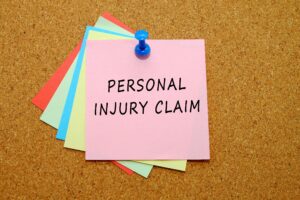Serious Injury At Work Claims In Scotland Explained
This is a guide on how to launch a personal injury claim for a serious injury at work in Scotland. After a life-changing injury at work, you may be impacted in several different ways, such as physically, psychologically, and/or financially. If you make a successful claim, you could be awarded compensation to address the different ways you have been affected by your serious injury.
As we move through this helpful guide, we provide information on the eligibility requirements for pursuing legal action against a negligent employer, the evidence you can gather to strengthen your case, and how settlements are calculated.
Additionally, we look at the duty of care employers owe their employees and how a breach of this duty could result in you suffering harm.
Finally, we provide information on the benefits of working with a solicitor under No Win No Fee terms and how they could help you seek compensation.
If you have any questions whilst or after reading, please get in touch with an advisor. They can provide free advice 24/7. To get in touch, you can:
- Call us for free on the number above.
- Use our live chat option.
- Contact us online.
Choose A Section
- When Are You Eligible To Make A Personal Injury Claim For A Serious Injury At Work?
- How Could A Serious Injury At Work Be Caused By Employer Negligence?
- How Much Compensation Could You Receive For A Successful Workplace Accident Claim?
- Evidence That Could Help Support Personal Injury Claims
- Claim Compensation With No Win No Fee Solicitors
- Learn More About Claiming Serious Injury At Work Compensation
When Are You Eligible To Make A Personal Injury Claim For A Serious Injury At Work?
In Section 2 of the Health and Safety at Work etc. Act 1974, the central piece of workplace health and safety legislation, employees are owed a duty of care by their employers. The duty requires them to take reasonable and practicable steps to prevent their employees from becoming harmed while working. If there is a failure to do so, it could lead to an accident in which an employee suffers a serious injury, such as severe crush injuries, amputation, paralysis, or severe head injuries and brain damage.
For a serious injury at work claim to be considered eligible, it’s important that you can show negligence occurred. In tort law, negligence means:
- You were owed a duty of care by your employer at the time and place of the accident.
- Your employer breached this duty of care.
- As a result of the breach, you suffered physically and/or psychologically.
To discuss your specific case and find out whether you’re eligible to make a work injury compensation claim, call an advisor on the number above.
How Could A Serious Injury At Work Be Caused By Employer Negligence?
Below, we have provided examples of how a serious injury at work could occur as a result of your employer breaching the duty of care they owe.
- There may have been a failure to ensure equipment, such as a ladder used for working at a height, provided for use at work was safe and fit for its intended purpose. As a result, an employee may have sustained a severe head injury leading to brain damage and multiple fractures after a fall from a height due to the faulty ladder.
- An employer may have failed to provide their employee with any training before instructing them to use a forklift truck. As a result, they may have lost control of the work vehicle and crashed causing them to suffer a spinal injury leading to partial paralysis.
- An employee may have suffered a severe burn injury from exposure to heat or chemicals. Employers must provide employees with any personal protective equipment (PPE) necessary to reduce the risk of injury where this risk cannot be fully removed. For example, when working with hazardous substances, gloves or goggles should be provided. Failure to do so could see the employee become injured.
If you have suffered a serious injury due to your employer failing to uphold their duty of care, call our team using the number above. They can assess your case for free and determine whether you’re eligible to seek personal injury compensation.
How Much Compensation Could You Receive For A Successful Workplace Accident Claim?
Successful serious injury at work claims can result in a settlement consisting of up to two heads of loss being awarded. These are:
- General damages: This head awards compensation for the pain and suffering of any injuries, physical, psychological, or both. When valuing this head, reference can be made to the Judicial College Guidelines (JCG) from the Judiciary UK. The JCG contains guideline award brackets for different injuries.
- Special damages: This head awards compensation for the financial losses incurred due to your injuries. For example, you may have needed to take time off work, change careers completely, or stop working altogether because of the serious injury you suffered. In this instance, you can claim for the past and future lost income incurred. Evidence, such as payslips, can help prove this loss in an accident at work claim.
Compensation Table
The table below contains figures from the JCG, with the exception of the first entry. Please keep in mind that the JCG is often used to help value claims in England and Wales. Also, the settlement you’re awarded in a successful workplace injury claim can vary from what’s listed in the table. As such, you should use the table as a guide only.
| Injury Type | Severity Level | Award Bracket Guidelines | Notes |
|---|---|---|---|
| Multiple Severe Injuries With Financial Losses | Severe | Up to £1,000,000+ | Compensation for the impact of multiple severe injuries and any financial losses caused, such as care costs, medical expenses, and lost income. |
| Head | (a) Very Severe | £282,010 to £403,990 | The person requires full-time nursing care due to poor language function, double incontinence, and little evidence of them having a meaningful response to their environment. |
| (b) Moderately Severe | £219,070 to £282,010 | The person has a very serious disability, either physical or cognitive, and requires constant professional care. | |
| Paralysis | Quadriplegia | £324,600 to £403,990 | Paralysis of the lower and upper body. The settlement awarded is influenced by different factors, such as whether they suffered any depression and how old they are. |
| Paraplegia | £219,070 to £284,260 | Paralysis of the lower body. The settlement given can depend on several factors, such as the person's life expectancy, age, and their degree of independence. | |
| Arm Amputation | (a) Loss of Both Arms | £240,790 to £300,000 | The person is fully aware of their injury and is reduced to a state of considerable helplessness. |
| Leg | (a) Amputation (i) | £240,790 to £282,010 | Both legs are lost. |
| Back | (a) Severe (i) | £91,090 to £160,980 | Damage to the spinal cord and nerve roots. |
| Scarring to Other Parts of the Body | Significant Burns | Likely to exceed £104,830 | Burns covering 40% of the body or more. |
For further guidance on the compensation you could potentially receive for a personal injury claim in Scotland, call our team on the number above.
Evidence That Could Help Support Personal Injury Claims
There are several pieces of evidence you could collect to support your serious injury at work claim, such as:
- Medical records, such as test results, X-ray scans, and doctor reports.
- A diary containing information about the medical treatment you needed and the way your injuries have affected you.
- CCTV footage showing your accident and injury.
- A copy of the report from the workplace accident logbook.
- Contact details from any witnesses. With these details, witness statements can be taken at a later date.
- Pictures of any visible workplace injuries and the accident scene, including any hazards that caused the accident.
If you work with a solicitor, they could help you build your case and present it in full on your behalf. Additionally, they can use their years of experience handling claims for workplace accidents to help you seek compensation.
For further guidance about using a solicitor when making an accident at work claim, please consider speaking to our advisors.
Claim Compensation With No Win No Fee Solicitors
The Civil Litigation (Expenses and Group Proceedings) (Scotland) Act 2018 states that a No Win No Fee personal injury solicitor could offer to represent your case under the terms of one of two types of contracts known as a Speculative Fee Agreement or a Damages Based Agreement.
This typically means there are no fees owed for your solicitor’s services in the event of an unsuccessful claim. Furthermore, you won’t need to pay for their work upfront or as the claim continues progressing.
Should your serious injury at work claim in Scotland claim prove successful, your solicitor deducts a success fee from your work injury compensation. This is taken as a percentage which has a legal cap ensuring you keep the majority of your awarded settlement.
Our team can answer any questions that you might still have about starting a serious injury at work claim. To reach out to them, you can:
- Call us for free on the number above.
- Use our live chat option.
- Contact us online about your accident at work claim.
Learn More About Claiming Serious Injury At Work Compensation
For more of our helpful guides relating to personal injury claims:
- Learn if you could claim compensation for burns at work caused by a negligent employer.
- Find out if you could seek compensation for a hand injury due to a third party breaching their duty of care.
- Read our guide about making a slip, trip, and fall injury claim that caused you to suffer harm.
For more external resources when making a compensation claim:
- Information about how the Health and Safety Executive (HSE) works in Scotland. The HSE is an independent regulator for workplace health and safety in Great Britain.
- Guidance on first aid from NHS Inform.
- Find out how to request CCTV footage of yourself with information from GOV.UK.
If you have any other questions about making a serious injury at work claim in Scotland, please get in touch with our team using the details provided above.





